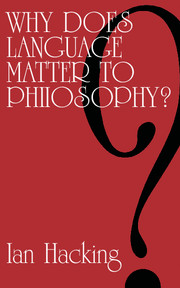9 - A. J. Ayer's verification
Published online by Cambridge University Press: 05 November 2012
Summary
To some extent it is possible to categorize important philosophical work as speculative or critical. Speculative philosophy tries to construct theories about reality, or the cosmos, or whatnot, in order to explain problematic features of what little we actually know about it. Thus Leibniz is one of the most speculative of philosophers. The word ‘critical’ comes from Kant's Critique of Pure Reason. Kant thought that Leibniz, among others, had endowed the universe with a good deal of structure which had been argued from inadequate, nay impossible, philosophical grounds. The speculative doctrines of monadology are not straightforwardly false, but are rather answers to a question which cannot have true or false answers. Leibniz vainly imagined (thought Kant) that reason can know the ultimate constituents of the universe. But no answer to the question ‘What is the world ultimately composed of?’ can be right. Kant elaborated his Critique partly in order to explain how such questions sound all right, while the very asking of them is a fundamental error.
Roughly speaking, speculative philosophy confronts a problem by constructing a theory that will solve the problem. Critical philosophy confronts a similar problem by showing that the problem is of a sort that cannot have an answer, and explains why we should have been misled into supposing that it has an answer.
- Type
- Chapter
- Information
- Why Does Language Matter to Philosophy? , pp. 93 - 102Publisher: Cambridge University PressPrint publication year: 1975



